|
|
|
Sort Order |
|
|
|
Items / Page
|
|
|
|
|
|
|
| Srl | Item |
| 1 |
ID:
172609
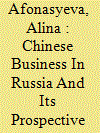

|
|
|
|
|
| Summary/Abstract |
This paper looks at some aspects of business activity and project work, outlining the business interests of Chinese major and mediumsized public and private companies in Russia, small businesses and microenterprises of Chinese migrants and their families, and also Chinese private entrepreneurs (PE) in the Russian Federation. All of these companies and private entrepreneurs whose position in Russia is getting stronger by the year are considered by the author the main entities of constructing the Russian section of the One Belt, One Road project (OBOR).
|
|
|
|
|
|
|
|
|
|
|
|
|
|
|
|
| 2 |
ID:
142791


|
|
|
|
|
| Summary/Abstract |
Since the early reform days and particularly during the Hu-Wen era, the local state has seen remarkable changes triggered by the central government's new focus on rural development and rural-urban integration. The "peasant burden" was reduced by the tax-for-fee reforms in 2002 and the abolition of the agricultural tax in 2006. Fiscal transfers were increased to provide more funding for local governments in order to ensure reasonable public goods provision as well as investment in agricultural modernization and in situ urbanization. At the same time, the performance evaluation of local cadres and government units has been streamlined to enforce stricter compliance with upper level policy guidelines and local governments have been systematically encouraged to engage in policy experimentation and innovation by linking policy success to cadre promotion. However, the local state, at all levels, is still struggling with "un(der)-funded" mandates, rising public demand and, as often reported, social protest. Against this background, this article argues that the concept of local developmentalism can still serve as a useful analytical tool to explain state-business relations at county level and below. The local state has maintained its control over private sector development and entrepreneurial agency by becoming an "interested facilitator" and "enabler" by withdrawing from its position as bureaucratic patron, cadre entrepreneur and corporate agent.
|
|
|
|
|
|
|
|
|
|
|
|
|
|
|
|
| 3 |
ID:
162352
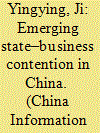

|
|
|
|
|
| Summary/Abstract |
Based on an in-depth case study of a business association, this article explores how private entrepreneurs are organizing for their rights and highlights contentious facets of the state–business relationship in China. In contrast to depictions common in the literature, this business association actively asserts and seeks to maintain its autonomy vis-a-vis the state and uses innovative strategies to strengthen its own organizational cohesion. It organizes collective actions to defend members’ interests and to enhance the transparency and accountability of the local government. It even advances universal values, such as equal rights to justice. Importantly, however, the initiation and effects of collective actions are contingent on the opportunities embedded in China’s fragmented governance structure. I argue that corporatist analyses characterizing Chinese business associations as lacking autonomy and as partners of the state have overlooked such associations’ potential to engage in confrontations with the state. Combining involvement in the formal institution and contentious collective actions, the association studied displays the tension between the incorporation system and social resistance in contemporary China.
|
|
|
|
|
|
|
|
|
|
|
|
|
|
|
|
| 4 |
ID:
139260
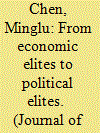

|
|
|
|
|
| Summary/Abstract |
The number of entrepreneurs in the system of People's Political Consultative Conferences (PPCC) has increased dramatically in the last two decades. Although the political importance of these local assemblies is usually dismissed, entrepreneur participation suggests a need for further investigation. Based on research on a city-level PPCC, this article seeks to interpret this phenomenon further. In the process of investigating private entrepreneurs' involvement in the PPCC, this article aims to re-examine the role of the local PPCC and to highlight private entrepreneur PPCC members' attitude to and expectations from the Party-state.
|
|
|
|
|
|
|
|
|
|
|
|
|
|
|
|
| 5 |
ID:
172654


|
|
|
|
|
| Summary/Abstract |
In this article, we join an ongoing debate among Western scholars on political representation and argue that political representation is undergoing a transformation stimulated by the rapid proliferation of the new information and communication technologies. We propose that in China, the new social media have stimulated a shift from representation by official organizations to bottom-up self-representation, and from mandate political representation to embodiment. To grasp this change, we select private entrepreneurs as our focus of study and propose the concept of “connective representation.” Drawing on fieldwork in China from 2015 through 2019 and on analysis of online materials, we demonstrate how private entrepreneurs in China form and advance their collective interests through online connectivity. The concept of connective representation adds to the conventional perspectives on political representation, particularly in the authoritarian setting.
|
|
|
|
|
|
|
|
|
|
|
|
|
|
|
|
| 6 |
ID:
153569


|
|
|
|
|
| Summary/Abstract |
China scholars have consistently described China’s private entrepreneurs
as politically co-opted by the Communist Party regime. Since
China’s economic development now overwhelmingly depends on the
performance of the private sector, the political dynamics and power
confi gurations within the current regime coalition between state and
business may have seen change over the past decade. Drawing on the
recent literature on state-business relations and fi eldwork conducted in
diff erent provinces, cities, and counties since 2012, this paper hypothesizes
that private entrepreneurs are a “strategic group” in Chinese
politics. By working through the multidimensional networks that crisscross
diff erent party-state units, administrative levels, and formal institutions
such as business associations and local parliamentary bodies all
over the country, private entrepreneurs act collectively, albeit in (as yet)
uncoordinated ways. By looking closely at the evolving governmentbusiness
nexus in China’s local state, this article sheds new light on
private entrepreneurs’ strategic action in China’s political system and
highlights that private entrepreneurs are increasingly infl uential within
the existing regime coalition.
|
|
|
|
|
|
|
|
|
|
|
|
|
|
|
|
| 7 |
ID:
147611
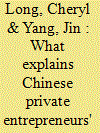

|
|
|
|
|
| Summary/Abstract |
This paper studies Chinese private entrepreneurs' charitable behaviors by exploring the dynamic reciprocal relationship between private firms and local governments. By using three waves of a nationwide survey of private firms in 2002, 2004 and 2006 from China, we provide robust evidence that Chinese private entrepreneurs with access to preferential loans from state-owned banks when their businesses first started are more likely to participate in donation and anti-poverty programs organized by the government, and the effects of such loans are more pronounced for small firms and firms in regulated industries. Furthermore, we find that this reciprocal relationship between local governments and private entrepreneurs is a personal relationship rather than an institutional relationship, which declines in importance in areas with better legal institutions and in regions with change of local leadership. Finally, there is evidence that Chinese private entrepreneurs' charitable behaviors are also motivated by political returns and other individual characteristics.
|
|
|
|
|
|
|
|
|
|
|
|
|
|
|
|
| 8 |
ID:
073380
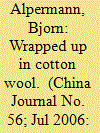

|
|
|
|
|
| Publication |
2006.
|
| Summary/Abstract |
The growing prominence of private entrepreneurs in China's economy poses a possible challenge to the supremacy of the Chinese Communist Party and its grip on political power. This paper examines the Party-state's counter-strategy of integrating entrepreneurs into the existing political system, using the newly liberalized cotton sector as an example. It is argued that entrepreneurs' integration into officially sanctioned organizations indeed has the intended effect of aligning their political thinking more closely with official discourses. However, the orientation of the local state toward the private economy also has considerable impact on political attitudes of private entrepreneurs. Thus, the success of the Party-state's strategy appears to be highly contingent on local patterns of state-society interaction.
|
|
|
|
|
|
|
|
|
|
|
|
|
|
|
|
|
|
|
|
|